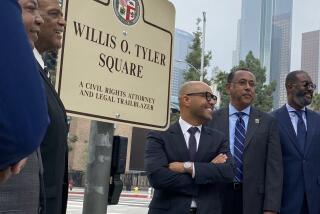Noted Defense Lawyer Monroe Dies at 69
- Share via
Keith C. Monroe, the Orange County criminal defense lawyer who in 1969 argued successfully before the U.S. Supreme Court a suspect’s right not to have his home searched without a warrant, has died. He was 69.
Remembered by colleagues for his keen legal mind and willingness to help others, Monroe will be dearly missed, Milton Grimes, who met Monroe in 1974, said Friday.
“He was never too busy to talk to you,” said Grimes, who represented motorist Rodney King in the lawsuit filed after King’s video-taped beating by police.
Grimes said that as the only African-American in his professional circle when he moved to Orange County, he felt a little at a loss, but Monroe quickly made him feel at home.
“He was one of the first lawyers I met when I came to Orange County who I felt comfortable talking to,” Grimes said.
Monroe was generous with his expertise and could always be counted on to give other defense lawyers tips on legal strategy or to cite important cases, Grimes said.
“I am going to miss that growling kind of voice and that wisdom,” Grimes said. “I will miss him dearly.”
Monroe died Thursday at Bartlett Care Center in Santa Ana after being diagnosed in July with esophageal cancer, said his wife, Waynne Monroe, 64. He had been semiretired since closing his law office two years ago.
Waynne Monroe said from the couple’s Santa Ana home Friday that her husband continued to live life to the fullest in his final months. The couple and their children took a train trip up the coast and to Reno last month. “He always wanted to do it,” she said.
Monroe was born in Pasadena on July 10, 1929. His father, a city councilman, died in a car accident when the son was only 8. Monroe attended Stanford University and eventually became a criminal defense lawyer, setting up office in Santa Ana in the mid-1960s.
In 1966, he represented a burglary suspect, Ted Chimel, in the case that eventually led to the landmark Supreme Court ruling. Monroe appealed Chimel’s initial conviction, arguing that authorities violated Chimel’s 4th Amendment rights against unreasonable searches and seizures when they went through his home.
Chimel vs. California set a precedent against illegal searches by authorities, but its broad scope has been narrowed over the years by the now much more conservative Supreme Court, said Nathan Schaye, a director with the National Association of Criminal Defense Lawyers.
Nevertheless, “it was a very significant decision at the time,” Schaye said.
At the state’s 4th District Court of Appeal, Presiding Justice David Sills remembered Monroe as a “gentleman among gentlemen.”
“In a day when civility in the practice of law seems to be lost, everyone can take pause and learn a lesson from him,” said Sills, who learned of Monroe’s death Friday morning.
Monroe is survived by his wife; daughters Theresa, 38, of Santa Ana, and Leslie Bengston, 36, of Anaheim; brother Gene, 79, of Yucca Valley; and three grandsons.
Waynne Monroe said that at her late husband’s request, there will be no memorial services. He will be cremated and his ashes scattered, she said.
More to Read
Sign up for Essential California
The most important California stories and recommendations in your inbox every morning.
You may occasionally receive promotional content from the Los Angeles Times.













